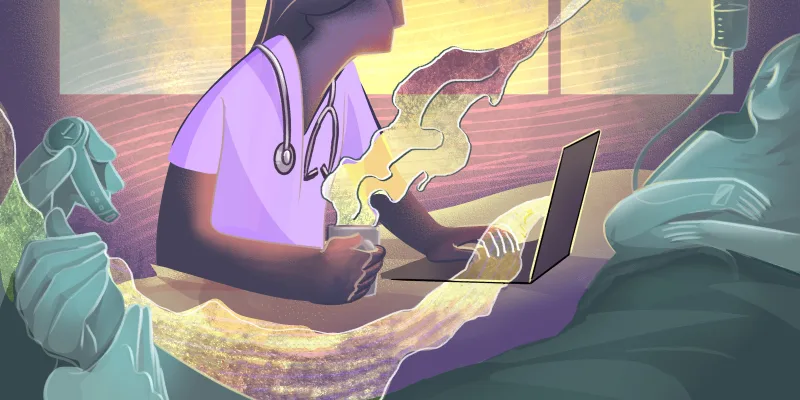
If you’re a medical student, you’re likely either interested in a career in psychiatry, ambivalent about the field, or convinced that it’s not the right fit for you. No matter which of these categories best describes you, I’d urge you to keep an open mind and keep reading. Psychiatry is the one field about which students seem to always have pre-conceived notions, but the reality of working in psychiatry is rarely what you expect it to be. Trust me, I was there once too.
Before I even started medical school, I was 100% convinced that I wanted a career in obstetrics and gynecology, a field that excited me and would allow me to follow in the footsteps of my OBGYN mother. I viewed obstetrics and gynecological surgery as exactly what I wanted — high powered, fast paced, and an opportunity to truly advocate for women’s’ health. Psychiatry wasn’t even on my radar. But for a series of reasons, many of which are noted below, I changed my mind throughout the application process, and I haven’t looked back since.
This, I discovered, was a common path for my psychiatry colleagues, many of whom had switched from their residencies or attending jobs in other fields into psychiatry.
A few days before the match, once I came to the realization that a career in OBGYN might not be the best fit for me, I scrambled to figure out what might be more suitable. I reviewed my notes from my rotations and interviews with various attendings, and I quickly realized that, incredibly, psychiatrists were the only physicians who consistently encouraged me to consider their field. So, what was making them so happy about their choice?
If your thought process is anything like mine was, you might be thinking that a “mainstream” medical specialty, like internal medicine or surgery, would be better. As psychiatrists, we’ve heard it all: “Psychiatry is more like art than science,” “Psychiatry is a pseudoscience,” various parallels drawn to One Flew Over the Cuckoos Nest, etc. Or, you may be worried that psychiatry is a field where the gains are few and far between, patients will always remain ill, and there is little room for career satisfaction. Medical students commonly bring up these concerns when discussing their decisions not to consider psychiatry. The reality is that these descriptions, really, don’t even begin to characterize the field.
Part art, all science. Like any other medical field, psychiatry is a science. Our algorithms and our medications are backed by evidence-based research. Yet, I won’t deny that there’s always room for creativity in psychiatry. In fact, the psychiatrist who recognizes that a one-size-fits-all approach is rarely an effective one for a diverse patient population is typically the most successful practitioner. It’s only in rare circumstances that prescribing an antidepressant blindly, without understanding a patient and making individualized treatment recommendations, will be successful. Rather, the best treatment plans are, like patients, complex. They’ll require multiple steps and creativity to ensure that they’re tailored to the patient’s needs. In this way, psychiatry is as much an art as any other field would be.
Diversity. Psychiatry, like other medical specialties, is an incredibly diverse field, both in our patients and in our providers. Our patients are old, young, rich and poor, professionals, and of various races, ethnicities and religions. We can practice in many settings, such as inpatient, outpatient, VA, university counseling centers, emergency rooms, medical wards, integrated into other specialty clinics (i.e. OBGYN, pediatrics) and prisons, to name a few. We are a group of younger and older clinicians, classically-oriented, therapy-practicing and gender-balanced. We are often liberal-minded. We are black, white, brown, Jewish, Christian, Hindu and Muslim. We have disabilities. We ourselves might be struggling with mental illness or trauma. Luckily, it’s such a broad field that each psychiatrist can find a niche that suits his or her unique set of interests or passions. Plus, our own life experiences and individual qualities can truly enrich the healing processes of our patients.
Work-life balance. A lot of psychiatrists will tell you that we enjoy a great work-life balance. Psychiatrists are often fortunate to have variability in their practices, which is known to be one of the most protective factors in preventing burnout. Many of us rotate through various work settings throughout a particular week or month, and about half of all psychiatrists maintain an outpatient practice, irrespective of primary employment. Recent data suggests that, while we aren’t immune to it, we experience burnout less frequently than do physicians in other fields.
Opportunity, purpose, and dedication. Recent data also shows that there is an extraordinary shortage of psychiatrists, and that this demand for psychiatrists will continue to grow. On the other hand, the rates of depression and other mental illnesses continue to increase, and parity laws have made insurance coverage for these mental health ailments more accessible than ever. While the shortage of psychiatrists is dire, this also means that each psychiatrist will have far more decision-making power when it comes to finding the exact occupational fit that works for him or her.
You probably already know that psychiatrists aren’t the highest earing bunch, but, then again, most of us don’t go into psychiatry for the money. In recent years, the demand for psychiatrists has driven the mean base salary up to approximately $263,000. Despite this, there are far more lucrative subspecialties, and those who are driven more by reimbursement rates might find themselves looking elsewhere.
Our own mental health. My medical colleagues ask me with wonder how I’m able to navigate the doctor-patient relationship; this very question makes me realize how much misinformation is present in the consideration of my field. The reality is that I’m delighted to have these interactions with my patients. Psychiatrists are privileged to experience a unique rawness and level of confidentiality from our patients, who typically will trust us enough to express their deepest struggles and innermost conflicts. Sure, it can be hard to listen to multiple stories of trauma, loss and sadness, and this can be mentally taxing, especially before one has developed the necessary skills to balance both a level of investment in the patient and detachment from the internalizing of such emotions. But this is hardly an unknown entity. In fact, many psychiatric residency programs encourage trainees to seek their own analysis in order to explore such emotions and experiences. If you worry about “going crazy,” recognize that this is less likely unique to psychiatry and more likely to be characterized by burnout. In fact, psychiatrists tend to be the mentally healthiest people I know, since we know what’s at stake in an unbalanced life!
A central role. All medical specialties manage psychiatric illnesses. (If you don’t believe me, ask a family practitioner or ER doc!). But, as psychiatrists, we’re fortunate to have the time and tools to manage them as our primary focus. I believe that psychiatry is a field in which a physician has the ability to make deep and meaningful change. With increased awareness around burnout, mental health disorders and substance dependence disorders, psychiatrists have taken more of a central role in medical teams in the management of patients.
As medicine continues to evolve, consider that psychiatry will in many ways be at the center of healthcare. It would be great to have you join us at the center as well!
Dr. Aparna Iyer is a psychiatrist and assistant professor at the University of Texas Southwestern Medical Center. She is also a 2017–2018 Doximity Fellow.







